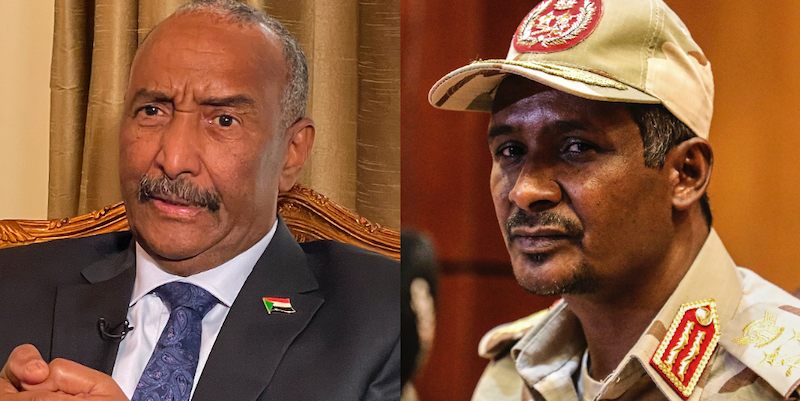Since Saturday morning very violent clashes have been going on in Sudan between the regular army and a paramilitary group called Rapid Support Forces. The clashes were concentrated in the capital Khartoum, where it all began with the bombing by the army of a military base controlled by the Rapid Support Forces. The fighting then spread to the presidential palace and the city’s airport, of which both warring factions claimed control. At least 97 civilians were killed in the clashes and more than 300 people were injured, according to a local medical association.
At the center of the fighting are the two most influential figures in Sudanese politics in recent years: the country’s president, General Abdel Fattah al Burhan, who commands the regular army, and his vice president, General Mohamed Hamdan Dagalo, known also like Hemedti, who instead is the head of the Rapid Support Forces.
Sudan is a huge country of 46 million inhabitants, which is located immediately south of Egypt and which is strategic for various political and military reasons. Among other things, it is one of the main departure points for migratory flows from sub-Saharan Africa to Libya and then embark on the Mediterranean. Burhan and Dagalo have shared control of the country since April 2019, or since the ousting in a coup of former president Omar al Bashir, who had ruled Sudan authoritarianly for thirty years. Burhan was then already the commander of the Sudanese army, which together with the civilian opposition movements led the coup.
Burhan is 63 years old and in his long career in the Sudanese army he stood out in particular for being one of the few non-Islamist generals during the Islamist regime of Bashir. One of the most discussed events of his military career was his participation as commander of the Sudanese army in the war in Darfur (western region of Sudan), which began in February 2003 between rebel groups and the central government, accused of oppressing the local non-Arab populations . During the conflict, some militias hired by the Sudanese army were accused of massive violence, rape and war crimes against people belonging to non-Arab communities.
Among these militias the most important was Janjaweed, composed mainly of Arab shepherds, who Bashir hired to suppress the rebellion of non-Arab populations. Dagalus was also part of it, and in a short time he became one of its main commanders. Not many details are known about his story: it is known that he is about 50 years old, that he has only an elementary school education behind him and has a past as a camel herdsman. Leading Janjaweed, he was responsible, among other things, for a massacre of 126 civilians in the city of Adwa, South Darfur, in November 2004.
The Rapid Support Forces were formed in 2013 at the behest of the Bashir government to bring together the Janjaweed militiamen into a better organized and trained military apparatus to fight in Darfur. Dagalus was immediately appointed its commander, but his role soon became much wider than simple military command. In 2017 he used the militia to take control of the Darfur gold mines, which allowed him to become very rich (it is estimated that it is one of the richest men in the country). Also thanks to the economic resources accumulated with the control of the gold mines of Darfur, the Rapid Support Forces today have weapons and equipment comparable if not superior to those of the regular army.
The relationship between Burhan and Dagalo began in the Darfur war, when the two began to collaborate for the first time, effectively dividing military power in the country. In the coup d’état of April 2019 Dagalo sided against Bashir and alongside the coup leaders: after a short period of democratic transition with former Prime Minister Abdalla Hamdok in government, in 2021 there was a new coup and Burhan became the head of Sudan’s Sovereign Council, the civilian-military body that was supposed to lead the country to democratic elections in 2023. Dagalo was named his deputy.
Although the two were formally allies in government, Dagalo always maintained a great deal of autonomy, and the Rapid Support Forces remained a separate group from the army, under its direct control. The alliance between the two has begun to become increasingly precarious in recent months, after Burhan’s government agreed to a deal in December 2022 to return power to a civilian administration.
Among other things, the agreement provided for the dissolution of the Rapid Support Forces, which should have merged into the regular army. However, Dagalo had immediately opposed it, fearing losing his power, and had said that the integration of his paramilitary group with the army would have required no less than ten years. Since then Burhan and Dagalo had begun exchanging very harsh accusations, making it clear that they were ready for armed confrontation, which finally took place on Saturday.

The smoke caused by the explosions a Khartoumin a satellite image (ANSA/EPA/MAXAR TECHNOLOGIES)

